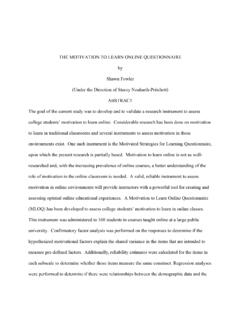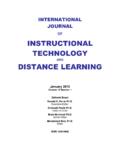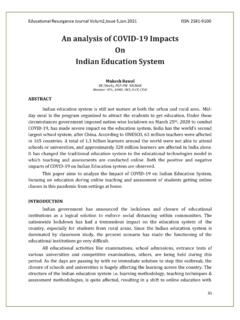Transcription of Face-to-Face vs On-line: An analysis of Profile, Learning ...
1 Universal Journal of Educational Research 5(10): 1701-1706, 2017 DOI: Face-to-Face vs On-l ine: An analysis of Profile, Learning , Performance and Satisfaction among Post Graduate Students Alberto Ortega-Maldonado*, Susana Llorens, Hedy Acosta, Cristi n Coo WANT Research Team, Universitat Jaume I, Spain Copyright 2017 by authors, all rights reserved. Authors agree that this article remains permanently open access under the terms of the Creative Commons Attribution License International License Abstract The aim of this study is to explore the differences between Face-to-Face and on-line students in a post graduate education program.
2 The variables considered are Post Graduate Student s profile, competences and Learning outcomes, academic performance and satisfaction. The sample was composed by 47 students (64% Face-to-Face ). analysis of variance (ANOVA) and student s t utilizing SPPS Statistics were performed. Results showed differences in all variables: (i) Regarding student profile, Face-to-Face students were younger and from a broader range of nationalities; (ii) Both students profiles showed positive and significant differences between their pre-post competences, Learning outcomes and self-evaluation scores in several of the programs courses.
3 Moreover, there were significant differences when considering specific courses and profiles; (iii) Face-to-Face students obtained better grades in 4 out of 7 courses of the post graduate program; (iv) Finally, Face-to-Face students reported higher satisfaction and a more positive perception of the teaching methodologies utilized than on-line students. Theoretical and practical implications are discussed to improve specific teaching methodologies for on-line students. Keywords Face-to-Face , On-line, distance Learning , Performance, Satisfaction 1.
4 IntroductionNowadays, distance education is consolidated within university setting. This Learning methodology allows access to higher education to a great diversity of people, addressing relevant issues, such as mobility, work-compatibility and conciliation of studies and personal life. In addition, distance education has become a powerful strategy for making higher education available for more people, regardless their economic and social conditions. Thus, actually more and more people access postgraduate and undergraduate studies than ever before.
5 However, this is an incipient area that still needs improvement. The use of the latest developments of information and communication technologies (ICT) could be a useful tool to improve distance education [1]. The information and telecommunications revolution emerged around twenty years ago. Since then many proposals have been developed for using ICT in the distance education s field. Hence, the concept of distance education has evolved to the idea of on-line education and new teaching and Learning strategies, methods and environments have been created [2].
6 Many on-line programs have emerged worldwide and the number of postgraduate studies has broadened. This new educational reality requests a pedagogical adaptation [3]. Considering this new reality, scholars and lecturers need to question the utility and the efficacy of the classical pedagogical tools within a new Learning context [3]. According to academic satisfaction literature, teaching methodology well-fitted to students characteristics is a relevant factor to improve quality in the Learning process [4].
7 Thus, a good adaptation to student s characteristics has been proposed as a key strategy to improve students satisfaction, which in turn would determine the success or failure of an e- Learning process [5]. In addition, there is evidence that academic satisfaction is related to academic performance in a higher education setting [6]. From an evidence-based perspective, it is necessary to evaluate the characteristics of the students to design a good individualized academic program. The main objective of this study is to assess the differences in personal characteristics, satisfaction, Learning and performance between Face-to-Face and on-line students of a Master in Work and Organizations Psychology and Human Resources (WOPHR).
8 Results will be useful for academic program curriculum development, as well as to assess the inclusion of methodologies aimed at increasing the quality of teaching- Learning process in the on-line program. 1702 Face-to-Face vs On-line: An analysis of Profile, Learning , Performance and Satisfaction among Post Graduate Students Postgraduate in Work and Organizations Psychology and Human Resources Improving technical skills is a significant strategy for professional development as it could be useful in enhancing employability [8].
9 In the Spanish and European context, practitioners and former university students ( , Human Resources workers, consultors, organizational psychologists, and managers) are currently interested in enrolling in a Master degree program in WOPHR. Recent graduates need to improve their knowledge and professional skills, but practitioners also need to update and reinforce their knowledge. Online postgraduate program facilitate access to high quality educational programs regardless geographical position.
10 This is particularly important for workers who seek to improve their knowledge and skills through higher education and or graduate specialization, but have limited time for face-to face lessons. Research highlight the different motives, personal and social characteristics students have to start an online university program, when compared to those who prefer face-to face instruction [7]. These differences are crucial for the program success, since they affect students satisfaction and quality of Learning . [5]. Taking into account the proposals and the information exposed above, this study explores the differences and similarities between both kinds of students in a specific Spanish postgraduate in WOPHR.
















